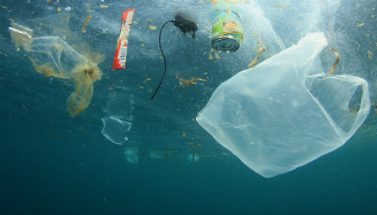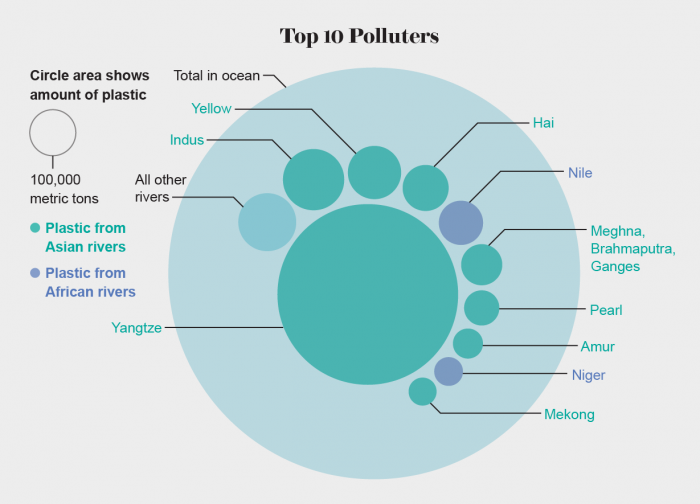The 10 rivers responsible for ninety-three percent of the plastic pollution at sea
FREE Catholic Classes
A new study has found that ninety percent of the plastic waste in the oceans comes from ten rivers, all in Asia and Africa.
We ask you, humbly: don't scroll away.
Hi readers, it seems you use Catholic Online a lot; that's great! It's a little awkward to ask, but we need your help. If you have already donated, we sincerely thank you. We're not salespeople, but we depend on donations averaging $14.76 and fewer than 1% of readers give. If you donate just $5.00, the price of your coffee, Catholic Online School could keep thriving. Thank you.Help Now >

Plastic waste pollutes our oceans and is killing wildlife.
Highlights
Catholic Online (https://www.catholic.org)
7/3/2018 (5 years ago)
Published in Green
Keywords: plastic oceans, wildlife, sea, rivers, pollution, source
LOS ANGELES, CA (California Network) - The world is now aware that our oceans are being inundated with plastic waste. That waste is destroying wildlife, especially seabirds. Plastic waste can last as long as 600 years in the ocean, and possibly much longer.
Each ocean appears to have at least one garbage patch, sometimes more. These garbage patches can stretch for hundreds of miles, such as the most infamous one in the North Pacific, which is larger than the state of Texas.
The problem of plastic waste is so great that many cities have started to outlaw single-use plastic items.
But will this make a difference? The short answer is yes, albeit a small one. That's because most of the plastic waste in our oceans appears to be coming from ten major rivers, all in Asia and Africa.
A study has been concluded which found that ninety percent of the world's ocean-bound plastic waste comes from ten rivers. The study was carried out in Germany by the Helmholtz Center for Environmental Research.
An estimated 8 million tonnes [metric] of plastic waste ends up in the oceans each year.
The worst source of plastic pollution was the Yangtze River in China. That river dumps some 1.5 million tonnes of plastic into the Yellow Sea each year.
The other rivers, in order, are; Indus, Yellow, Hai, Nile, Ganges, Pearl, Amur, Niger, and Mekong.

Scientific American
All rivers carry plastic pollution into the oceans in some measure, but the ten above are responsible for 93 percent of the overall pollution.
A major problem is how communities dispose of their waste. A lack of recycling and poorly engineered rubbish dumps are major problems. Public littering is also a major contributor. Rains and floods often sweep up large quantities of plastics, which float. Once introduced to a waterway, plastics often make their way downstream and into larger bodies of water. Eventually, those large rivers dump into the ocean. In this way, plastic waste dumped hundreds of miles from the sea can end up in the middle of the Pacific.
The solution is multi-fold. First, it is recognized that the plastic in the ocean will be nearly impossible to clean up. The plastic there will continue to harm wildlife for centuries to come. The best solution seems to be to take measures to curtail plastic dumping. Solutions include plastic bans, especially on single-use items, improved recycling programs, and better-engineered sanitation facilities. Public education along with programs to curtail littering can help.
 Hi readers, it seems you use Catholic Online a lot; that's great! It's a little awkward to ask, but we need your help. If you have already donated, we sincerely thank you. We're not salespeople, but we depend on donations averaging $14.76 and fewer than 1% of readers give. If you donate just $5.00, the price of your coffee, Catholic Online School could keep thriving. Thank you. Help Now >
Hi readers, it seems you use Catholic Online a lot; that's great! It's a little awkward to ask, but we need your help. If you have already donated, we sincerely thank you. We're not salespeople, but we depend on donations averaging $14.76 and fewer than 1% of readers give. If you donate just $5.00, the price of your coffee, Catholic Online School could keep thriving. Thank you. Help Now >
There are also ways to intercept plastic before it enters the ocean. Various contraptions have been developed to clean waterways, rivers, and oceans. These will have to be deployed. Volunteer cleanup can also make a difference.
We must focus on those nations that are responsible for this pollution, and take steps to ensure they clean up their rivers. And we must focus on ourselves. We should police ourselves, refrain from littering, discourage others from littering, encourage one another to dispose of plastics responsibly, and when needed, lend a hand to pick up plastic trash.
Only by making such a concerted effort on both a personal and international level can we clean up our oceans and minimize the damage we continue to do. If we don't, we risk losing the life in our oceans, upon which all life on the planet depends.
Keep in mind, if the ocean dies, everyone dies.
---
'Help Give every Student and Teacher FREE resources for a world-class Moral Catholic Education'
Copyright 2021 - Distributed by Catholic Online
Join the Movement
When you sign up below, you don't just join an email list - you're joining an entire movement for Free world class Catholic education.
-

-
Mysteries of the Rosary
-
St. Faustina Kowalska
-
Litany of the Blessed Virgin Mary
-
Saint of the Day for Wednesday, Oct 4th, 2023
-
Popular Saints
-
St. Francis of Assisi
-
Bible
-
Female / Women Saints
-
7 Morning Prayers you need to get your day started with God
-
Litany of the Blessed Virgin Mary
Sacrifices of Faith: The Pro-Life Legacies of St. Gianna and Jessica Hanna
-

How to love God by caring for our bodies
-

Pope Francis calls for negotiations to End Russia-Ukraine War
-
Pope Francis Contemplates Return to U.S. for United Nations Assembly Address
-
Pope Francis Calls on Faithful to Embrace Faith, Hope, and Charity in New Teaching Series
Daily Catholic
 Daily Readings for Sunday, April 28, 2024
Daily Readings for Sunday, April 28, 2024 St. Peter Chanel: Saint of the Day for Sunday, April 28, 2024
St. Peter Chanel: Saint of the Day for Sunday, April 28, 2024 Prayer before a Crucifix: Prayer of the Day for Sunday, April 28, 2024
Prayer before a Crucifix: Prayer of the Day for Sunday, April 28, 2024- Daily Readings for Saturday, April 27, 2024
- St. Zita: Saint of the Day for Saturday, April 27, 2024
- Prayer for the Dead # 2: Prayer of the Day for Saturday, April 27, 2024
We ask you, humbly: don't scroll away.
Hi readers, it seems you use Catholic Online a lot; that's great! It's a little awkward to ask, but we need your help. If you have already donated, we sincerely thank you. We're not salespeople, but we depend on donations averaging $14.76 and fewer than 1% of readers give. If you donate just $5.00, the price of your coffee, Catholic Online School could keep thriving. Thank you.Help Now >
![]()
Copyright 2024 Catholic Online. All materials contained on this site, whether written, audible or visual are the exclusive property of Catholic Online and are protected under U.S. and International copyright laws, © Copyright 2024 Catholic Online. Any unauthorized use, without prior written consent of Catholic Online is strictly forbidden and prohibited.
Catholic Online is a Project of Your Catholic Voice Foundation, a Not-for-Profit Corporation. Your Catholic Voice Foundation has been granted a recognition of tax exemption under Section 501(c)(3) of the Internal Revenue Code. Federal Tax Identification Number: 81-0596847. Your gift is tax-deductible as allowed by law.








 Daily Readings for Sunday, April 28, 2024
Daily Readings for Sunday, April 28, 2024 St. Peter Chanel: Saint of the Day for Sunday, April 28, 2024
St. Peter Chanel: Saint of the Day for Sunday, April 28, 2024 Prayer before a Crucifix: Prayer of the Day for Sunday, April 28, 2024
Prayer before a Crucifix: Prayer of the Day for Sunday, April 28, 2024
